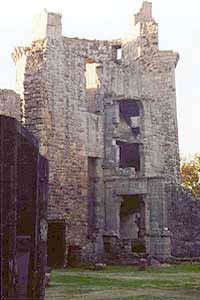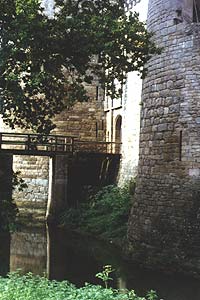|
History of the castle
 It
is in Brittany many castles in ruins: many was imposing fortresses
whose walls succumbed under the attacks of the warriors and the
blows of the time to which, sometimes, the revolutionary vandals
lent the hand. It
is in Brittany many castles in ruins: many was imposing fortresses
whose walls succumbed under the attacks of the warriors and the
blows of the time to which, sometimes, the revolutionary vandals
lent the hand.
Some go up well beyond XVème century, at the time where feudality
was very powerful. Others are older still. Their walls are collapsed
partly, but what it of remainder attests that those which built
them could link, in a sometimes formidable unit, elegance and the
force. It is the impression which one carries when one visits, in
the commune of Plédéliac, the castle of Hunaudaye,
whose ruins, become the prey of brambles and ivies, are drawn up
like a majestic challenge at time, in a site of a savage size.
The five enormous turns which flanked it still upright, but are
decapitated. The part which was remained livable was burnt in 1793.
The castle of Hunaudaye is old seven centuries. Its construction
by Olivier Tournemine goes up at the year 1220 and its name would
come to him from the current village of Midsummer's Day much older
than him, which named then the City-Hunaudaye and to which it was
very close.
Originating in England, the house of Tournemine was allied in Penthièvre.
Among its members it is who were true gangsters and who did not
move back in front of the flight and the assassination. It is Geffroi
Tournemine which plunders and holds to ransom Plancoët and
steals the sacred vessels of the vault of Lesberroit; it is Pierre
Tournemine who stops the bishop of Saint-Brieuc crossing the forest
of Hunaudaye in 1384, removes his horses to him and its luggage
and returns freedom to him only with the help of ransom. Two years
later, December 20, 1386, this same Pierre Tournemine assassinates
his father-in-law Jean de Beaumanoir. He confesses his crime and
tries to be justified. But the Due one of Brittany decides, at the
request of Robert de Beaumanoir, wire of the victim, to resort to
the judgement of God. The legal duel takes place in the presence
of all the court. Pierre Tournemine is embanked by his adversary
which, liberally, instead of completing it or to make it hang, makes
him grace.
At some time from there, Jean Eder de Beaumanoir married Marie de
Villiers, rams of Homet of Bérardière, dowager of
Hunaudaye, mother of George and Jean de Tournemine. Dissatisfied
with this marriage, two young people attracted, under pretext of
a shooting party, their father-in-law in the forest of Hunaudaye
and loosely made it assassinate under their eyes by Jean of Breil
and one their bastard brothers.
 The
tradition ensures that well of other dramas were held in Hunaudaye.
The castle had become an object of terror. Nobody dared to venture
in the surroundings. Tournemine did not respect anything. The queen
Anne, itself, crossing the forest at the time of her voyage to Brittany
to go to Folgoët, were stopped and led in the presence of the
lord of the places. He made it treat with regard, but supported
that he had the right to put at ransom whoever passed daN -, his
vicinity without his permission. He came one time when the rumour,
increasing on the truth, showed the dreaded Master of the proud
residence to have assassinated his/her father, his wife and her
brother. He could not any more, said one, to know softnesses of
the sleep. One night, a draped knight of a red coat presented himself
in front of the lord of the manor. Celuici called its people to
punish this unknown which dared to penetrate in its room without
to have been made announce. As no one did not answer its call, it
saw, behind the man with the red coat, three spectra between opening
their shroud and showing their bored and bloody centre. The
tradition ensures that well of other dramas were held in Hunaudaye.
The castle had become an object of terror. Nobody dared to venture
in the surroundings. Tournemine did not respect anything. The queen
Anne, itself, crossing the forest at the time of her voyage to Brittany
to go to Folgoët, were stopped and led in the presence of the
lord of the places. He made it treat with regard, but supported
that he had the right to put at ransom whoever passed daN -, his
vicinity without his permission. He came one time when the rumour,
increasing on the truth, showed the dreaded Master of the proud
residence to have assassinated his/her father, his wife and her
brother. He could not any more, said one, to know softnesses of
the sleep. One night, a draped knight of a red coat presented himself
in front of the lord of the manor. Celuici called its people to
punish this unknown which dared to penetrate in its room without
to have been made announce. As no one did not answer its call, it
saw, behind the man with the red coat, three spectra between opening
their shroud and showing their bored and bloody centre.
- I do not have other guard, known as the knight: this old man,
it is your father; this woman it is your wife; this young man, it
is your brother. They come to seek you so that from now on you residences
with them. At this time a violent one storm burst. The ridge of
the turns, struck by the lightning, broke down. When, the following
day, one penetrated in the lord of the manor, one found it dead
on the ground.
|



 It
is in Brittany many castles in ruins: many was imposing fortresses
whose walls succumbed under the attacks of the warriors and the
blows of the time to which, sometimes, the revolutionary vandals
lent the hand.
It
is in Brittany many castles in ruins: many was imposing fortresses
whose walls succumbed under the attacks of the warriors and the
blows of the time to which, sometimes, the revolutionary vandals
lent the hand.  The
tradition ensures that well of other dramas were held in Hunaudaye.
The castle had become an object of terror. Nobody dared to venture
in the surroundings. Tournemine did not respect anything. The queen
Anne, itself, crossing the forest at the time of her voyage to Brittany
to go to Folgoët, were stopped and led in the presence of the
lord of the places. He made it treat with regard, but supported
that he had the right to put at ransom whoever passed daN -, his
vicinity without his permission. He came one time when the rumour,
increasing on the truth, showed the dreaded Master of the proud
residence to have assassinated his/her father, his wife and her
brother. He could not any more, said one, to know softnesses of
the sleep. One night, a draped knight of a red coat presented himself
in front of the lord of the manor. Celuici called its people to
punish this unknown which dared to penetrate in its room without
to have been made announce. As no one did not answer its call, it
saw, behind the man with the red coat, three spectra between opening
their shroud and showing their bored and bloody centre.
The
tradition ensures that well of other dramas were held in Hunaudaye.
The castle had become an object of terror. Nobody dared to venture
in the surroundings. Tournemine did not respect anything. The queen
Anne, itself, crossing the forest at the time of her voyage to Brittany
to go to Folgoët, were stopped and led in the presence of the
lord of the places. He made it treat with regard, but supported
that he had the right to put at ransom whoever passed daN -, his
vicinity without his permission. He came one time when the rumour,
increasing on the truth, showed the dreaded Master of the proud
residence to have assassinated his/her father, his wife and her
brother. He could not any more, said one, to know softnesses of
the sleep. One night, a draped knight of a red coat presented himself
in front of the lord of the manor. Celuici called its people to
punish this unknown which dared to penetrate in its room without
to have been made announce. As no one did not answer its call, it
saw, behind the man with the red coat, three spectra between opening
their shroud and showing their bored and bloody centre. 
